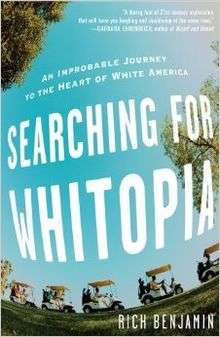Searching for Whitopia
 Softcover edition | |
| Author | Rich Benjamin |
|---|---|
| Country | United States |
| Language | English |
| Subject | Race and ethnicity in the United States |
| Genre | Non-fiction |
| Publisher | Hachette Books |
Publication date | October 6, 2009 |
| Media type | Print, e-book |
| Pages | 368 pages |
| ISBN | 978-1401322687 |
Searching for Whitopia: An Improbable Journey to the Heart of White America is a 2009 non-fiction book by Rich Benjamin.[1][2]
In May 2010, Benjamin briefly summarized his experiences in a TED talk.[3]
Overview
African American journalist Rich Benjamin documents his journeys to find out why more and more white Americans move to small towns and areas that are, for the most part, white, and to explain why Whitopias are growing and what it means for the United States.
Benjamin mounted a two-year tour of the United States, covering 26,907 miles (43,303 km), looking for "Whitopias", which he defined as:[4]
- an area which has experienced at least 6% growth rate since 2000;
- the great majority of that growth consists of white persons;
- the area has a pleasant look, feel, ambiance, or charm.
He spent several months in three such areas: St. George, Utah, Coeur d'Alene, Idaho, and Forsyth County, Georgia (north of Atlanta). In each case, he generated a master plan to thoroughly immerse himself in the community's core, with lists of the power brokers, the important groups, and the significant events. He tried to volunteer or involve himself with those people and groups.
His experiences
In St. George, Benjamin rented a house (over the telephone) in a gated community ("La Entrada"). He took up golfing, fishing, and poker ("Texas hold 'em"). He was generally welcomed in every instance, and learned that the dominant topic in St. George was illegal immigration; a local group had been organized to fight immigration, and they held regular rallies.
In Idaho, Benjamin rented (again, over the telephone) a resort cabin ("Almost Heaven") on the lake. He found a significant number of retired LAPD officers living there, and also found a significant number of gun owners (he learned to shoot a pistol at the local gun range). He spent a three-day retreat (the only non-Aryan journalist in the group) at the Council of Aryan Nations compound. He was told that the group is not "white-supremacy"; they are "white-segregation" - they merely don't want to live in close proximity to non-Aryan people. He noted the preponderance of Confederate flags (he counted more Confederate flags than black people in the city). He was also told that there were more gun stores than service stations in the area.
In Georgia he found the predominant cultural activity revolved around a mega-church ("First Redeemer Church"), so he involved himself in its activities. He felt the most comfortable in this situation, since both blacks and whites in this area are used to seeing the other - as contrasted to the first two sites, where a black person is still a rarity.
References
- ↑ James, Randy (12 October 2009). "America's Booming White Enclaves". Time. Retrieved 10 April 2012.
- ↑ "A Black Author's Journey Into American 'Whitopia'". NPR. 6 October 2009. Retrieved 10 April 2012.
- ↑ Benjamin, Rich (May 2015). "My road trip through the whitest towns in America". TED.
- ↑ Benjamin, Rich (2009). Searching For Whitopia. Google Books. Hachette Books. p. 2.